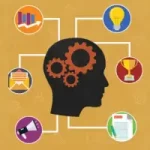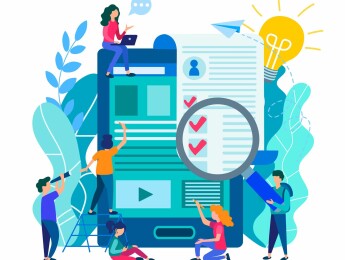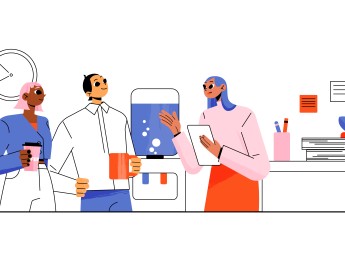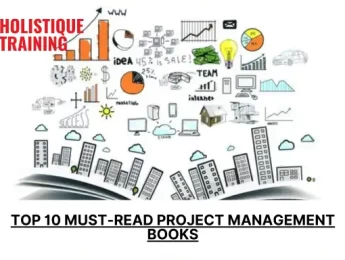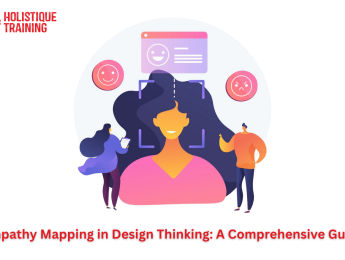- Table of Contents
- Introduction
- Why Are Workplace Skills Evolving So Rapidly?
- Soft Skills vs. Hard Skills: What’s the Difference?
- What Do Employers Really Want in 2025?
- The Top 9 Skills Employers Are Looking For in 2025
- 1. Digital Literacy and Tech Savviness
- 2. Emotional Intelligence (EQ)
- 3. Adaptability and Resilience
- 4. Critical Thinking and Problem Solving
- 5. Communication Skills
- 6. Collaboration and Teamwork
- 7. Leadership and Initiative
- 8. Data Literacy
- 9. Cultural Intelligence and DEI Awareness
- Upskilling and Reskilling: Your Career Lifeline
- Conclusion
Introduction
As we navigate a fast-paced world reshaped by technology, remote work, and global economic shifts, the skillsets that employers look for in candidates are evolving at an unprecedented rate. Gone are the days when a college degree and a strong resume were enough to secure a promising job. In today’s labor market, the ability to adapt, learn continuously, and demonstrate practical competencies has become the gold standard.
Industries are transforming rapidly due to digital transformation, artificial intelligence (AI), and automation. At the same time, hybrid work models and remote teams are pushing organizations to seek professionals with advanced interpersonal skills, digital literacy, and the ability to collaborate from anywhere in the world. Employers are focusing not only on technical expertise but also on the human skills that technology cannot replicate.
To stay competitive in this changing landscape, professionals must understand what employers are looking for and how they can align their personal development with market needs. Whether you are a recent graduate or a seasoned professional considering a career shift, staying informed about in-demand skills is the first step to success.
In this article, we will explore why workplace skills are evolving so rapidly and how the rise of automation, AI, and remote work is reshaping the professional world. We'll examine the distinction between soft and hard skills and explain why both are crucial for success in the modern workforce. You'll gain insight into what employers are genuinely looking for in 2025, including traits like adaptability, digital literacy, and emotional intelligence. As companies shift toward skills-based hiring models, we'll discuss how this trend impacts job seekers and career growth. We'll then dive deep into the top nine skills employers value most right now and how mastering them can give you a competitive edge. To help you identify your own strengths and gaps, we'll share practical ways to assess your current skill set. You’ll also learn why continuous upskilling and reskilling are essential to staying relevant in a rapidly changing job market. Finally, we’ll highlight how developing these skills will not only open doors to better opportunities in 2025 but also safeguard your long-term career path in the future of work.
Why Are Workplace Skills Evolving So Rapidly?
The nature of work is undergoing profound changes, driven primarily by digital transformation, automation, artificial intelligence (AI), and remote work. These forces are altering job roles across industries, requiring employees to update their skills more frequently than ever before.
Digital transformation is streamlining operations and introducing new tools and platforms, making it essential for professionals to master evolving technologies. In fields like marketing, finance, healthcare, and education, digital tools have redefined job functions and communication patterns. Even traditional industries like manufacturing now rely on advanced systems such as IoT (Internet of Things) and robotics.
Automation is replacing routine tasks, freeing up human employees for more strategic, creative, or interpersonal work. This shift requires higher-order thinking skills, emotional intelligence, and adaptability. According to a McKinsey report, by 2030, up to 30% of current work activities could be automated, underscoring the need for a new set of competencies.
Artificial intelligence is also reshaping how decisions are made and tasks are executed. Professionals must now work alongside AI, understanding its capabilities and limitations. This requires a hybrid skillset that blends data literacy with critical thinking.
Meanwhile, the global shift to remote and hybrid work has created a demand for professionals who can communicate effectively across digital platforms, manage their own time, and collaborate with diverse, geographically dispersed teams.
These dynamics are not only changing what we do at work but also how we do it. The ability to learn, unlearn, and relearn is now a critical survival skill in a fluid job market.
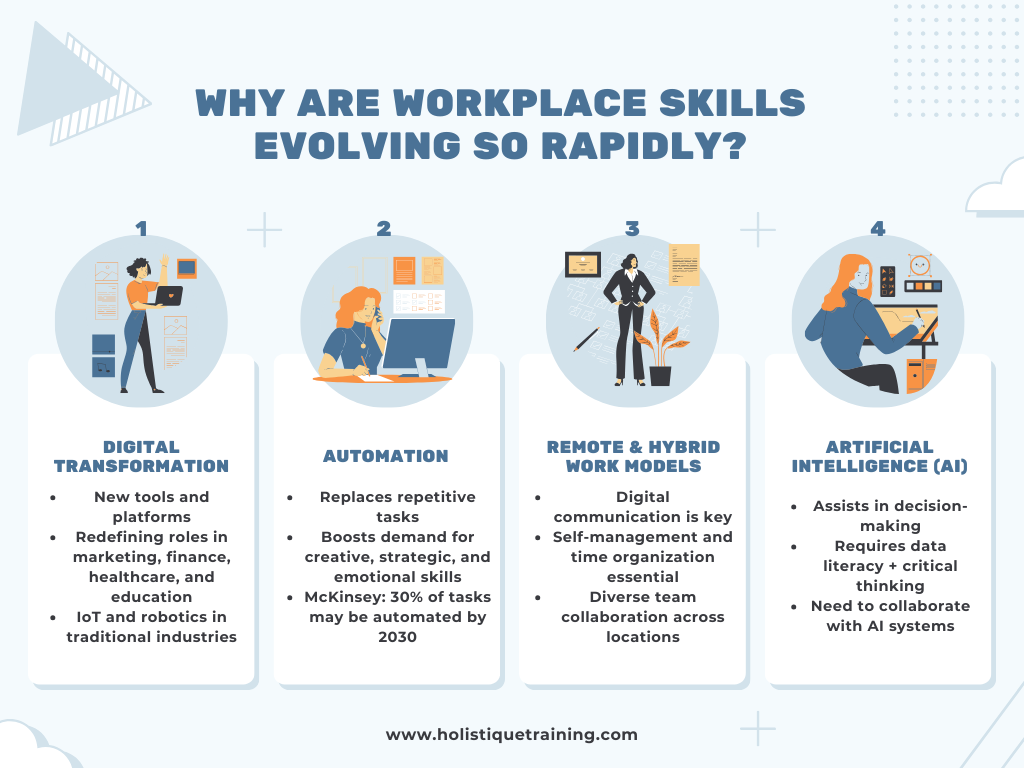
Soft Skills vs. Hard Skills: What’s the Difference?
In the modern workplace, both soft skills and hard skills are essential—but they serve different purposes. While hard skills refer to the technical abilities or knowledge you've gained through education and experience, soft skills are more about how you work and interact with others.
Soft skills are often called "people skills" or "interpersonal skills." They include communication, teamwork, adaptability, and emotional intelligence. These are crucial in a world where collaboration happens across borders and through screens.
Hard skills, on the other hand, are teachable and measurable abilities. These might include coding, data analysis, proficiency in a foreign language, or the use of specific software platforms.
Here's a simple table to differentiate:
Soft Skills | Hard Skills |
Communication | Programming (e.g., Python) |
Adaptability | Data Analysis |
Problem-Solving | Project Management Tools (e.g., Asana) |
Emotional Intelligence | CRM Systems (e.g., Salesforce) |
Time Management | Foreign Language Proficiency |
Both types of skills complement each other. For example, a data analyst must not only understand statistical software but also communicate findings clearly to non-technical stakeholders. In 2025 and beyond, employers will continue to seek candidates who demonstrate both categories in balance.
What Do Employers Really Want in 2025?
Employers in 2025 are prioritizing candidates who can thrive in dynamic, tech-driven environments. Technical qualifications still matter, but they are no longer sufficient. Instead, companies are seeking well-rounded individuals who combine domain knowledge with transferable soft skills.
Adaptability is key. With industries evolving rapidly, employees must adjust to new workflows, technologies, and even job roles. Digital literacy is equally critical as more business operations move online.
Emotional intelligence and collaboration are also in high demand. As remote and hybrid models dominate, communication, empathy, and the ability to work in diverse teams are non-negotiable.
Moreover, employers favor self-starters—those who are proactive about learning and can manage their workload independently. Creativity, problem-solving, and resilience are seen as indicators of future leadership potential.
Traditionally, hiring decisions were based on degrees, job titles, and years of experience. But in 2025, more companies are adopting a skills-based hiring model. This approach prioritizes what a candidate can do over where they studied or previously worked.
According to a 2024 report by LinkedIn, 45% of recruiters now use skills assessments as a core part of the hiring process. Platforms like Coursera, LinkedIn Learning, and Skillshare are increasingly recognized as credible learning sources.
Skills-based hiring promotes diversity, levels the playing field, and helps employers tap into a broader talent pool. It also encourages job seekers to build relevant, future-ready skills rather than rely solely on formal qualifications.
As a result, professionals who continuously update their competencies are far more attractive in this new hiring landscape.
The Top 9 Skills Employers Are Looking For in 2025
As we approach the midpoint of the decade, the job market is undergoing a transformation like never before. In this shifting landscape, employers are no longer focused solely on degrees or rigid job titles—they’re scanning for real-world capabilities that match the pace of innovation and the needs of a global workforce. Whether you're an entry-level applicant or a mid-career professional, mastering the right mix of skills can set you apart. Below, we explore the top nine competencies that are in high demand in 2025 and why they matter more than ever.
1. Digital Literacy and Tech Savviness
Being digitally literate in 2025 doesn’t just mean knowing how to send emails or use Word and Excel. It’s about understanding how digital tools impact business operations, knowing how to collaborate in digital ecosystems, and keeping up with rapidly evolving platforms like AI-powered collaboration tools, cloud-based management systems, and data analytics software. From retail to healthcare, nearly every sector is embracing digital transformation. According to the World Economic Forum’s 2023 Future of Jobs Report, 85 million jobs may be displaced by a shift in the division of labor between humans and machines, while 97 million new roles may emerge adapted to the new division.
Digital savviness enables employees to transition seamlessly between tools and workflows. Candidates who can demonstrate comfort with learning and applying new technologies are automatically more valuable to employers. Even non-technical roles increasingly require an understanding of platforms like Microsoft Teams, Google Workspace, or customer relationship management (CRM) systems.
2. Emotional Intelligence (EQ)
Machines may outperform humans in processing data, but they still lag behind when it comes to interpreting emotions and managing interpersonal relationships. Emotional intelligence—the ability to recognize, manage, and respond to emotions in oneself and others—is a defining skill for high-functioning teams. In hybrid or remote work environments, where cues like body language and tone are often filtered through a screen, EQ becomes even more essential. A 2022 Harvard Business Review study found that leaders with high emotional intelligence foster more productive and loyal teams, resulting in 20% higher performance scores across departments.
Employees with strong emotional intelligence resolve conflicts more effectively, promote psychological safety, and help create inclusive environments. They are the glue that binds teams, especially in high-stress or high-change situations. As workplaces become more diverse and global, EQ helps navigate cultural nuances and build authentic relationships.
3. Adaptability and Resilience
If the past few years have taught us anything, it’s that change is the only constant. From pandemic disruptions to economic volatility and technological leaps, today’s professionals need to be able to pivot quickly without losing momentum. Adaptability is more than just reacting to change—it’s anticipating it, embracing it, and innovating through it. Similarly, resilience helps professionals cope with stress, recover from setbacks, and continue contributing effectively under pressure.
In dynamic industries like tech, media, or healthcare, where shifts happen overnight, employers look for individuals who don’t just survive change but thrive in it. They seek those who can juggle changing priorities, switch tasks efficiently, and stay focused on outcomes despite ambiguity.
4. Critical Thinking and Problem Solving
As automation takes over repetitive tasks, humans are increasingly expected to do what machines cannot—think critically, evaluate options, and make informed decisions. Critical thinking involves analyzing information objectively and making reasoned judgments. Problem solving complements this by applying logic, creativity, and innovation to find solutions to business challenges.
Employers across industries, from logistics to finance, report that strategic thinking and the ability to resolve complex problems are among their top hiring criteria. For example, PwC’s 2023 Global Workforce Hopes and Fears Survey revealed that 77% of CEOs believe that a lack of soft skills—especially critical thinking—is limiting their organizations’ ability to innovate. Candidates who can bring structure to chaos and resolve issues independently contribute directly to efficiency and competitiveness.
5. Communication Skills
Effective communication remains a timeless skill—but its form and function have evolved. In 2025, communication is not just about public speaking or writing well—it’s about being able to tailor your message to different formats, cultures, and contexts. Whether you’re delivering a presentation via Zoom, writing a report for global stakeholders, or giving feedback asynchronously, the ability to convey ideas clearly is invaluable.
Miscommunication can cost companies both time and money. Strong communicators ensure alignment, promote transparency, and reduce friction across departments. In multicultural teams, cross-cultural communication skills can make the difference between collaboration and conflict.
6. Collaboration and Teamwork
Even with rising automation, teamwork remains core to business operations. What’s changed is how teams work—often virtually, across time zones, and through digital platforms. Collaboration in 2025 requires not just the ability to work well with others but also the skills to co-create, share knowledge, and support a shared vision despite physical distances.
Tools like Slack, Trello, Asana, and Miro are reshaping how professionals engage. People who can thrive in remote or hybrid teams, build consensus, and maintain accountability are in high demand. Successful collaborators know how to listen, compromise, and contribute without micromanaging.
7. Leadership and Initiative
Leadership isn’t just for managers. In the modern workplace, every employee is expected to take initiative, make decisions, and guide small projects or teams. This decentralized leadership model rewards individuals who are proactive, self-directed, and capable of influencing others even without formal authority.
Employers look for people who can identify opportunities, take responsibility, and motivate those around them. Whether it’s launching a new internal process or mentoring a peer, showing leadership potential can fast-track your career path. A 2023 LinkedIn report found that companies that invest in leadership development are 3.5 times more likely to outperform competitors in retention and growth.
8. Data Literacy
In today’s data-driven world, understanding how to read, interpret, and communicate data insights is no longer a niche skill—it’s a core expectation. From marketers analyzing campaign metrics to HR professionals interpreting employee satisfaction dashboards, data is integral to daily decisions. Data literacy doesn’t mean becoming a data scientist—it means understanding the story behind the numbers.
Employees with this skill can use evidence to back their decisions, identify trends, and recommend improvements based on facts. Organizations prefer data-literate employees because they reduce guesswork and add strategic value.
Here’s a snapshot comparing data literacy to other top skills:
Skill | Relevance in Remote/Hybrid Work | High Demand Industries | Growth Potential |
Data Literacy | High | Tech, Marketing, Finance | Very High |
Communication | Very High | All sectors | High |
Emotional Intelligence | Medium | Healthcare, Education, HR | High |
9. Cultural Intelligence and DEI Awareness
As companies expand globally and strive to create inclusive workplaces, cultural intelligence (CQ) has become a non-negotiable asset. This skill reflects an individual’s ability to work respectfully and effectively across cultures, identities, and perspectives. It’s especially important in diverse teams where biases—both conscious and unconscious—can hinder productivity or innovation.
Professionals with high CQ help build psychologically safe spaces and contribute to Diversity, Equity, and Inclusion (DEI) initiatives. They bring cultural sensitivity to their work, which in turn improves client relationships, team dynamics, and product outcomes. In fact, a McKinsey & Company 2023 study found that companies in the top quartile for ethnic diversity in leadership were 36% more likely to outperform competitors in profitability.
Upskilling and Reskilling: Your Career Lifeline
To remain relevant, continuous learning is essential. Upskilling means enhancing your current abilities, while reskilling involves learning new ones to shift into different roles or industries.
Start small: take a short online course, attend a webinar, or join a professional group. Invest time in mastering one skill at a time, and apply what you learn in real-world contexts.
Platforms like Holistique Training, Coursera, edX, LinkedIn Learning, and Udemy offer flexible, accessible ways to build future-ready skills.
By making learning a habit, you future-proof your career and demonstrate initiative—a trait every employer values.
Conclusion
The job market in 2025 will reward those who are agile, proactive, and well-equipped for constant change. Mastering these top 9 skills employers value not only makes you more competitive ,but also opens doors to higher salaries, better job satisfaction, and long-term career stability.
In a world where knowledge becomes outdated quickly, the real advantage lies in your ability to learn, adapt, and grow. Don't wait for opportunities to come to you—create them by investing in yourself.
Take the first step today. Explore our curated courses to develop the skills employers are actively seeking in 2025. Your future starts now.





